- Clone
- A15095A (See other available formats)
- Regulatory Status
- RUO
- Other Names
- Inhibin BA (INHBA), Inhibin B-1, Follicule stimulating hormone-releasing protein (FRP), FSH releasing protein, FSH releasing factor, Erythroid differentiation factor (EDF)
- Isotype
- Mouse IgG2b, κ
- Ave. Rating
- Submit a Review
- Product Citations
- publications
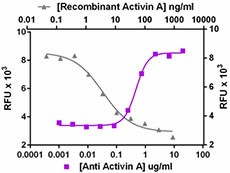
-

Recombinant human Activin A (grey triangles) inhibits the proliferation of mouse plasmacytoma cell line MPC 11. Anti-human Activin A antibody (clone A15095A, purple squares) inhibits the effect of recombinant Activin A (at 30 ng/ml) in MPC 11 cells in a dose dependent manner. The ND50 = 0.35 - 1.05 µg/ml.
| Cat # | Size | Price | Quantity Check Availability | Save | ||
|---|---|---|---|---|---|---|
| 693603 | 100 µg | 215 CHF | ||||
| 693604 | 1 mg | 715 CHF | ||||
Activin A was initially identified in ovarian fluid as a stimulator of FSH secretion from anterior pituitary cells. Activin A is a member of the TGFb1 family which includes TGFs, Activins, Nodal, growth and differentiation factors (GDF), and bone morphogenetic proteins (BMPs). Activin A is a dimer of the beta A subunits of human inhibin; the beta A subunit binds the beta B subunit of inhibin to form Activin AB. The beta B subunit also exists as a heterodimer to form Activin B. Activin A binds two type I and two type II serine/threonine kinase receptors at the same time. The type II receptor kinase is constitutively active and phosphorylates the type I receptor after the formation of the ligand-receptor complex. Five type II receptors have been identified: ActRIIA, ActRIIB, BMPRII, TGFβRII, and MISRII. ActRIIB binds to Activin A, BMP-2, BMP-7, GDF-8, and GDF-11. The type I receptors are named activin receptor-like kinases 1 to 7 (ALK1~7), and Activins bind to ALK4 and ALK7. Follistatin (FS) is a natural Activin A antagonist; FS neutralizes its biologic activities by preventing Activin A interaction with its receptors. Activin A has pleiotropic functions. It is a morphogen during embryonal development, regulating chondrogenic and osteogenic differentiation of mesenchymal progenitor cells (MPC). Activin A has been associated with neuroprotection, apoptosis, and fibrosis. Also, high levels of Activin A have been found in synovial fluid from patients with rheumatoid arthritis, inflammatory bowel disease, and gout. In addition, it has been speculated that Activin A, in collaboration with TGFb1 and IL-25, promotes TH9 generation and the development of allergic pathology.
Product DetailsProduct Details
- Verified Reactivity
- Human
- Antibody Type
- Monoclonal
- Host Species
- Mouse
- Immunogen
- Recombinant human Activin A.
- Formulation
- 0.2 µm filtered in phosphate-buffered solution, pH 7.2, containing no preservative.
- Endotoxin Level
- Less than 0.01 EU/µg of the protein (< 0.001 ng/µg of the protein) as determined by the LAL test.
- Preparation
- The Ultra-LEAF™ (Low Endotoxin, Azide-Free) antibody was purified by affinity chromatography.
- Concentration
- The antibody is bottled at the concentration indicated on the vial, typically between 2 mg/mL and 3 mg/mL. Older lots may have also been bottled at 1 mg/mL. To obtain lot-specific concentration and expiration, please enter the lot number in our Certificate of Analysis online tool.
- Storage & Handling
- The antibody solution should be stored undiluted between 2°C and 8°C. This Ultra-LEAF™ solution contains no preservative; handle under aseptic conditions.
- Application
-
Neut - Quality tested
- Recommended Usage
-
Each lot of this antibody is quality control tested by neutralizing the inhibition of proliferation induced by human recombinant Activin A (30 ng/ml) on mouse plasmacytoma cell line MPC 11. ND50 range: 0.35 – 1.05 µg/mL. It is recommended that the reagent be titrated for optimal performance for each application.
- Product Citations
-
- RRID
-
AB_2632840 (BioLegend Cat. No. 693603)
AB_2632840 (BioLegend Cat. No. 693604)
Antigen Details
- Structure
- Homodimer.
- Distribution
-
BM-derived stromal fibroblasts, aortic smooth muscle cells, pulmonary epithelium, and CD4 T cells.
- Function
- Activin A plays a key role in embryogenesis, neointimal formation after arterial injury, early stages of chondrogenesis, osteogenesis, and hemopoiesis. Activin A drives TH9 differentiation in vitro. It is induced by Angiotensin II and alpha Thrombin and regulated by Follistatin. Activin A is induced by inflammatory cytokines and inhibited by glucocorticoids.
- Interaction
- The receptors for Activin A are expressed by many stromal cells, among them fibroblasts, hepatocytes, myometral cells, vascular endothelial cells, and neuronal progenitor cells.
- Ligand/Receptor
- Type I receptors ALK4 and ALK7, type II receptors ActRIIA and ActRIIB.
- Cell Type
- Fibroblasts, Epithelial cells, T cells
- Biology Area
- Cell Biology
- Antigen References
-
1. Schwall RH, et al. 1988. Mol. Endocrinol. 2:1237.
2. Hashimoto M, et al. 1992. J. Biol. Chem. 267:4999.
3. Shav-Tal Y, Zipori D. 2002. Stem Cells 20:493.
4. Dohi T, et al. 2005. Gastroenterology 128:411.
5. Tsuchida K, et al. 2008. Endocr. J. 55:11.
6. Djouad F, et al. 2010. Stem Cell Research 1:11.
7. Sako D, et al. 2010. J. Biol. Chem. 285:21037.
8. Jones CP, et al. 2012. J. Allergy Clin. Immunol. 129:1000. - Gene ID
- 3624 View all products for this Gene ID
- UniProt
- View information about Activin A on UniProt.org
Related Pages & Pathways
Pages
Related FAQs
- Do you guarantee that your antibodies are totally pathogen free?
-
BioLegend does not test for pathogens in-house aside from the GoInVivo™ product line. However, upon request, this can be tested on a custom basis with an outside, independent laboratory.
- Does BioLegend test each Ultra-LEAF™ antibody by functional assay?
-
No, BioLegend does not test Ultra-LEAF™ antibodies by functional assays unless otherwise indicated. Due to the possible complexities and variations of uses of biofunctional antibodies in different assays and because of the large product portfolio, BioLegend does not currently perform functional assays as a routine QC for the antibodies. However, we do provide references in which the antibodies were used for functional assays and we do perform QC to verify the specificity and quality of the antibody based on our strict specification criteria.
- Does BioLegend test each Ultra-LEAF™ antibody for potential pathogens?
-
No, BioLegend does not test for pathogens in-house unless otherwise indicated. However, we can recommend an outside vendor to perform this testing as needed.
- Have you tested this Ultra-LEAF™ antibody for in vivo or in vitro applications?
-
We don't test our antibodies for in vivo or in vitro applications unless otherwise indicated. Depending on the product, the TDS may describe literature supporting usage of a particular product for bioassay. It may be best to further consult the literature to find clone specific information.
Other Formats
View All Activin A Reagents Request Custom Conjugation| Description | Clone | Applications |
|---|---|---|
| Ultra-LEAF™ Purified anti-Activin A | A15095A | Neut |
Customers Also Purchased
Compare Data Across All Formats
This data display is provided for general comparisons between formats.
Your actual data may vary due to variations in samples, target cells, instruments and their settings, staining conditions, and other factors.
If you need assistance with selecting the best format contact our expert technical support team.
-
Ultra-LEAF™ Purified anti-Activin A
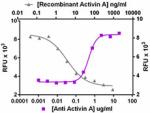
Recombinant human Activin A (grey triangles) inhibits the pr...

 Login / Register
Login / Register 





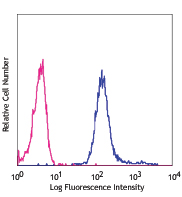
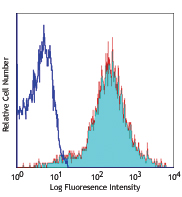
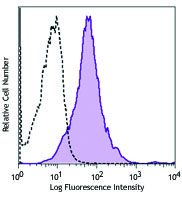




Follow Us